Reflective Practitioners’ Story on OER & OEP – Anuradhapura
Center: Anuradhapura Regional Centre, OUSL
Team: Explorers
Participants: B.K.I. Dinushani
S.B.Nadeesha Dilani Bandara
W.G.K.C. Priyadarshani
Writer: B.K.I. Dinushani
Translators/Editors: L. Ranjan Gonsalkorale
W.M. Sunil Weerakoon
First perception/Impressions
We did not know about OER before starting this programme. Actually we did not have any understanding regarding OER and their usages and advantages. We were able to get some awareness on OER through the first programme. Although we have got and used some subject matters, videos, audios from the internet for our daily teaching-learning process, we did not have any awareness regarding the specific licenses of OER teaching-learning materials. This project was helpful for us to identify relevant OER and ultimately it helped in improving our teaching-learning process. We think as teachers we should be good examples to our students. The initial workshop helped us to understand the use of resources available in the internet in an ethical way. On the other hand this initial workshop motivated us to understand and to think about copyright laws also. Some reflections made by our colleagues at the initial workshop given below show the importance and the significance of this workshop for us.
Student Teacher 01- “Today I recognized what are the OER and now I can use it to my teaching learning process effectively”
Student Teacher 02- “It is very helpful to improve my teaching- learning process. it is better to spend more time to this practice.
Student Teacher 03- “Today I could learn about importance of OER as a teacher. So in future I hope to utilize OER for my learning-teaching process”
Starting point of integration of OER
This research project started on 29th March 2015 at OUSL- Anuradhapura Regional Center. After a brief introduction on OER and the proposed research project by Mr. W.M.S. Weerakoon before starting the particular project in a day-school, we were motivated to join in the research project. We understood as a team that we should continuously participate in all activities of the research project. Even though 40 volunteers expressed their willingness to participate at the beginning only 26 teachers attended the first workshop. There were many reasons for their absence. At that time there were zonal education workshops and paper marking. Some were absent due to private and official matters. Prof S.P.Karunanayaka , Mr. L.R.Gonsalkorale and Dr. S. Kugamoorthy participated as resource parsons for the first workshop . All the resource persons made their efforts to clarify and raise our awareness on OER. We were able to see a video on OER concept showing that “copying is not theft”. Then we understood how to use shared materials to create innovative things. On the first workshop we constructed concept maps. They were very simple.Followings are some concept maps that we constructed at the 1st workshop.
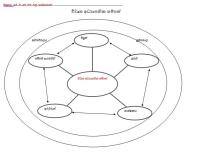
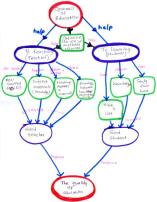
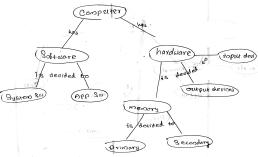
Figure 1- Initial concept maps
Adoption & Integration of OER
Actually we think the second workshop (Mid-Intervention workshop) that organized by the research team helped us very much to change our mindsets. We were able to get a full understanding and knowledge on OER through printed materials that were distributed during the Mid-intervention workshop time. On the other hand discussions and presentations conducted by Prof. S.P. Karunanayaka using Video Conferencing helped to increase our awareness on OER and there usages further more. The images given below illustrate Prof. Karunanayaka addressing the participants via Video Conferencing from the OUSL main Centre and participants engaging in activities at Anuradhapura.
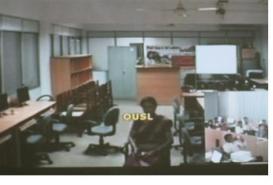
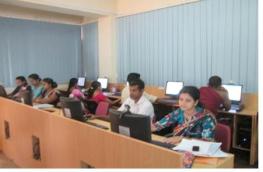
Figure 2- Students engaging in workshops
This research project opened a new avenue for us to practice and find OER through internet and LMS. Workshop activities helped us to identify relevant OER and identify the nature of their licenses. On the other hand it helped us to gain some knowledge and practice of the 4R concept through practical activities organized during the workshop time. Actually we were able to understand about the OER and its different licenses with the symbols of them. Some of them are as follows
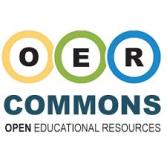
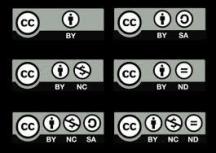
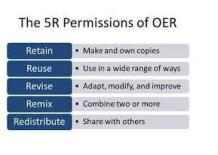
Figure 3- OER-related concepts we learnt
Developing concept maps was a very important segment of the workshop and the resource persons made their efforts to give full knowledge and practice to build concept maps and we were able to create concept maps based on OER and OEP. Initially we were able to express our thinking and awareness on “Openness in Education” then we were able to construct improved concept maps by using our extended knowledge on OER and their practices. Followings is a concept map constructed by one of our team members at the Mid-intervention workshop.
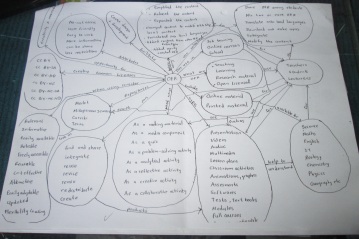
Figure 3- Concept map Version 2
During the Mid-intervention workshop we were able to find relevant OER for related subjects of our school curriculum. The Table given below indicate some OER links relevant to some subjects found by our team.
| Subject | Url (Web link) |
| Mathematics(Secondary) | http://www.open.edu/openlearnworks/mod/subpage/view.php?id=56440 |
| English (Secondary) | http://www.open.edu/openlearnworks/mod/subpage/view.php?id=56423 |
| Home Economics | https://www.oercommons.org/browse?f.general_subject=nutrition |
Notes of reflections added by the colleagues at the Mid-intervention workshop show the importance and the significance of the workshop activities they have fulfilled. Some note of reflections included in the reflective journal in the LMS by the participants are mentioned below.
Student Teacher 01- “OER පිලිබඳ තිබු දැනුම පුළුල් කර ගැනීම ට අද දින වැඩ මුළුව බොහෝ ඉවහල් විය. මෙතක් පැවති ගැටලු බොහොමයක් අද දින විසදුන අතර දිගටම මෙ සමග සම්බන්ධ වීමට බලපොරොත්තු වෙමි. ම විසින්ම නිර්මාණය කරන ලද OER මෙය ට ඇතුලත් කිරීමට පෙලබවීමක් ඇති විය.”
Student Teacher 02- “Today I got a real understanding of what is OER. Today got a chance to use the method of using OER, such as selecting subject related materials, understanding the kind of license of OER, shearing the knowledge, about the uploading of materials. Therefore I must thank for our lecturer Mr .Sunil Weerakoon & Prof. Shironika Karunanayaka for giving us valuable knowledge regarding OER”
Student Teacher 03- Actually today I was able to gain lot of knowledge about OER. For an example about their licenses Because those days I tried to log into the LMS, but I was failed. I think today I was successful. Mr Sunil Weerakoon helped for my success. “Thank you Sir & dear Madam”. I think OER will help me to become a valuable & confident teacher.
Organizing a Mid-Intervention workshop helped to share our experience with each other and get further practice and guidance on integrating OER into our teaching-learning designs. Actually it was very benefitial for us to introduce using a summary table format to record integrating OER into our lessons. Some summary tables with OER integration included into LMS by the participants mention below.
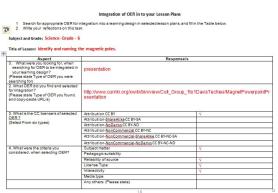
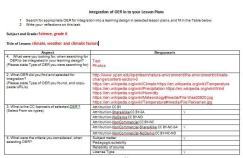
Figure 4- OER Integration Summary Tables
Focus-group discussions conducted by Mr. Sunil Weerakoon during the Mid-intervention workshop time helped us to further increase our awareness on OER. These also helped us to be clear about the future activities that we are going to plan during 3rd school term. At these discussions we mentioned some activities we are going to plan and implement to promote OER within the school and classroom setting. . Some examples are mentioned below:
- Organizing workshops to raise awareness for teachers on OER and OER-related concepts and practices.
- Preparing OER –Learning Resources Bank for particular subject areas for the usage of teachers in their school.
- Establishing OER School Clubs
- Sharing OER integrated teaching-learning materials and other resources with our colleagues.
This Mid-intervention workshop was very helpful to use OER-integrations to improve our teaching learning process. Preparation of lesson plans, using video, audio and animations were facilitated by this experience. OER integration helped to maintain students’ attention very well in the classroom. It helped to complete our school syllabus in advance.
Challenges/ Frustrations
Some participants had to take their personal leave to participate in series of workshops. Because of that some school principals were not willing to offer official leave for this purpose. Lack of resource (computer facilities) available in the school was one of the most significant barriers we faced when integrating OER into the teaching-learning process. Although we have limited resources for this task school administration and other authorities were not willing to give their support to succeed this movement.Lack of computer skills and computer literacy also were main obstacles in engaging in the project activities. Time management problem was also one of the key challenges faced by our group members.
We took a full effort to make our students aware on OER and their practices. Most of the students of our school system are used to traditional ways of teaching-learning methods with traditional teaching-learning materials. Therefore it was very difficult to change them for this novel way of teaching and learning setting. In our school system we don’t have sufficient opportunities to use the internet facility. Many of the teachers were reluctant to practice and undergo this experience due to lack of English knowledge.
Achievements/Successes
Even though we faced a lot of difficulties as mentioned above, we could also gain lot of advantages by engaging with these activities. We were able to prepare student activities, and evaluations using OER. On the other hand, OER helped us to prepare teaching learning aids activities in an effective way. Our team members were able to create our own OER with our own language. An example of an OER created by one of our colleagues is given below.
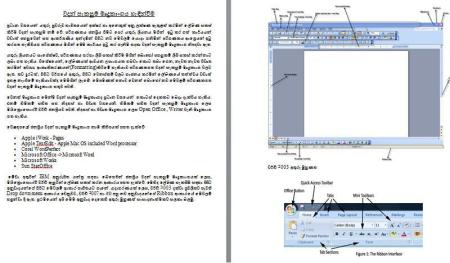
Figure 5-OER created by a student teacher
We understood that we can use OER available in the internet in an ethical manner. Now we can consider the copyright matters when using teaching-learning materials available in the internet. Beside the traditional way of teaching-learning process we can adopt new and innovative methods and techniques with the help of OER. This research project helped us to create a sharing culture among our colleagues. We were able to improve our relationship with other teaches with this new sharing culture. We were able to share OER materials we found from the Internet and also resources we created as OER with our colleagues, with the confirmation of their licenses. We were able to find relevant OER using most popular OER repositories Like Merlot, Curriki, and OER Commons for various subjects in our school curriculum. Some examples are given below.
http://www.oercommons.org/courses/adjacent-angles/view
https://www.oercommons.org/courses/graphing-linear-equations-2
https://www.merlot.org/merlot/assignments.htm?category=2513&isSerc=false&
http://www.curriki.org/oer/Volume–Formulas-practice-worksheet/?mrid=19026
Eg –Civic Education
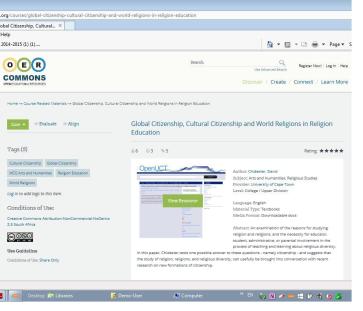
When considering whole process of the research project we think now we have a broader knowledge and awareness on OER and OER related practices. The final group concept map constructed by us is a good evidence to demonstrate our enriched awareness on OER & OEP. Final concept map constructed by us is illustrated below.
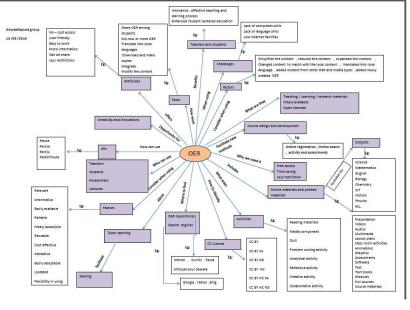
Figure 6- Final Group Concept Map
Actually now we think we have sufficient confidence to find relevant OER to integrate in our teaching-learning process.
During the project we were able to closely work with the educational specialists, Professor Som Naidu and Professor Shironica Karunanayaka (Project leaders). Actually we consider that a great opportunity to our success. We were able to gain a lot of experience through working with them, sharing their knowledge and experiences for us to succeed in this remarkable journey.
During the Final Evaluation workshop one of our colleague was able to win the best student teacher award for our Centre.

Good Practices
Sharing the OER created by us with our colleagues is a very good practice resulted through this experience. Integrating OER into our teaching learning process also enabled the integration of new and innovative methods and techniques, and with the help of OER we could improve our teaching learning process.
Impacts on the Teaching-Learning Process
OER integration helped us to our teaching-learning process and maintain it effectively. This helped to improve the quality of the teaching learning process. We could manage time in an effective way in the class room. It was easy to teach OER integrated lessons to the students. When considering the changing world, we are able to find /search quality teaching learning materials shared through the internet or OER repositories and thus this movement helped us to become innovative thinkers.
Actually earlier we used internet resources for our teaching learning process without considering much about copyright laws. After involving in this research project we understood the importance of copyrights and using quality teaching-learning materials ethically. We identified the significance of using OER for our teaching-learning process. We can easily find relevant OER for particular subjects we are teaching using OER repositories. Now we are confident to integrate OER in our teaching learning process.
Future plans
As mentioned earlier some of our team members were able to organize awareness programmes for other teaching staff of their own school to aware them on OER . We hope to organize more small-scale workshops and discussion forums for teachers in our school to make them aware about OER and their practices. We also plan to organize awareness programmes for students on OER, and organize awareness programmes for school principals with the support of Zonal Director of Education.